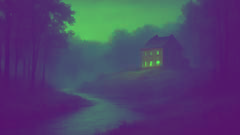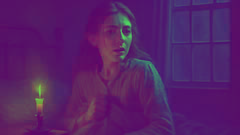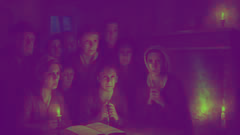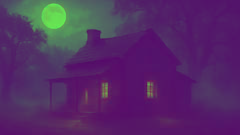Introduction
Along the undulating hills of early 19th-century Tennessee, when the wilderness pressed close against newly cleared fields and the night stretched deep and thick, a legend grew. The Bell family—John, his wife Lucy, and their children—had come to Adams, Tennessee, seeking prosperity and peace on a plot of fertile land bordered by the Red River. Their days were filled with hard labor: tilling the soil, tending to livestock, building a future from raw timber and hope. Yet as dusk settled and the woods whispered with the sounds of hidden creatures, something older than the trees watched from the shadows. Whispers, at first, just on the edge of hearing—a name called when no one was near, the soft creak of a rocking chair in an empty room. Then, the sounds grew bolder: the thunder of fists against walls, untraceable footsteps on porch planks, a woman’s laughter echoing from the thicket. The Bell Witch, as she would come to be called, invaded the Bell family’s home and hearts, turning the ordinary rhythms of frontier life into a waking nightmare. Neighbors heard the tales and came to witness the haunting for themselves. Some left terrified, others convinced of the supernatural, as the Bell Witch’s cruelty intensified. She pinched, slapped, and tormented young Betsy Bell, whispered secrets to guests, and made chilling predictions. The family’s faith, sanity, and very sense of reality were tested as the unseen force showed intelligence and malice, striking at their most vulnerable moments. What began as a whisper in the dark became a storm that threatened to rip the family apart, drawing the entire community into a struggle against something beyond the reach of reason or prayer. The legend endures not simply because of the horrors that unfolded in that Tennessee homestead, but because it reflects the frontier’s deepest fears: that in a wild land, some evils cannot be fenced out, and some spirits refuse to rest.
Whispers in the Red River Valley
The Bell family’s new home stood proudly on a gentle rise above the Red River, surrounded by rich bottomlands and stands of walnut and hickory. John Bell was known among his neighbors as a man of steadfast character: a fair dealer, pious, and determined to provide for his wife Lucy and their growing brood. Settlers in Robertson County valued hard work and faith. The land had its own secrets, though. Older folk spoke of burial mounds hidden in the woods and told stories of strange lights floating in the dusk. But the Bells, like many pioneers, brushed off such tales as backcountry superstition—until the night those whispers found their way inside.

The Unseen Tormentor
It began with small disturbances—sounds that could have been blamed on animals or wind. Lucy heard what she thought were rats gnawing at the bedposts. John would be woken by the sound of something dragging across the attic floor. At first, they tried to explain it away. Perhaps the children had been careless, or perhaps their nerves were frayed from too many long days and too little rest. But when Betsy, the Bell’s only daughter, began to complain of her hair being pulled and hands slapping her face while she slept, the mood in the house shifted from unease to terror.

The invisible force seemed to delight in Betsy’s suffering. At night she’d scream in fright as cold fingers pinched her arms or as a voice hissed secrets into her ear—words no child should hear. Objects moved on their own. Blankets were yanked from beds. Doors slammed in empty rooms. The Bell boys—Drewry and Richard—grew pale and silent, and even the servants whispered prayers behind closed doors.
John Bell, desperate to protect his family, turned to his Bible, then to his neighbors. The tales spread quickly. Visitors arrived, skeptics and the devout alike. Some came with holy water, some with bravado, others with trembling hands. Each left with stories of their own: a spectral voice that answered their questions, objects tossed across rooms, sudden gusts of icy air. The entity seemed to know each guest’s fears, mocking them or offering chilling predictions about their futures.
The Witch Reveals Herself
As the attacks escalated, the Bell Witch grew bolder. She began to speak in a harsh, rasping voice that seemed to come from thin air. Sometimes she sang hymns mockingly, other times she recited scripture with perfect accuracy. She claimed to be 'Kate,' a spirit wronged and seeking vengeance, though her stories contradicted themselves. The family and community struggled to make sense of her identity. Was she the ghost of a neighbor? A demon, as some preachers insisted? Or something older, tied to the land itself?

Neighbors—drawn by both concern and morbid curiosity—gathered nightly at the Bell home. The Witch delighted in their fear, revealing secrets no one should have known. She would mimic voices, insult guests, and once even predicted a neighbor’s death with chilling precision. When John Bell fell ill, the Witch’s glee became apparent. She taunted him, threatening that he would never recover, her voice echoing through the rafters late into the night.
Meanwhile, Betsy’s suffering intensified. The spirit forbade her from marrying her sweetheart, Joshua Gardner. Whenever the two were together, the air grew frigid and Betsy’s body would convulse with terror. The Witch’s vendetta seemed personal, her wrath focused on both John and Betsy. Lucy Bell, steadfast and gentle, became the Witch’s sole exception. The spirit praised Lucy’s goodness, sometimes even bringing her fruit or singing soothing lullabies, a twisted display of selective mercy.
Conclusion
John Bell’s health declined steadily under the Witch’s torment. On the morning of December 20, 1820, his body was found lifeless in bed, his face twisted in pain. A small vial of strange black liquid was discovered nearby—one the Witch claimed she had given him. The family tried to feed it to the cat, which died instantly. The Witch howled with laughter. The Bell patriarch was buried beneath an ancient oak as mourners whispered prayers, their voices trembling with fear that the Witch might strike again. After John’s death, the Witch’s attacks lessened. She promised to return in seven years, and some say she did, haunting the family anew for a brief time before fading back into legend. Yet in Adams, Tennessee, stories lingered. Children dared each other to visit the old Bell Witch Cave. Travelers spoke of eerie lights and whispered voices near the ruins of the homestead. The legend of the Bell Witch became woven into the fabric of Southern folklore—a cautionary tale about pride, secrets, and forces beyond understanding. Even now, when the night grows still and the wind rustles through ancient trees, some say you can hear laughter drifting across the fields, and wonder if the Bell Witch has ever truly left.













